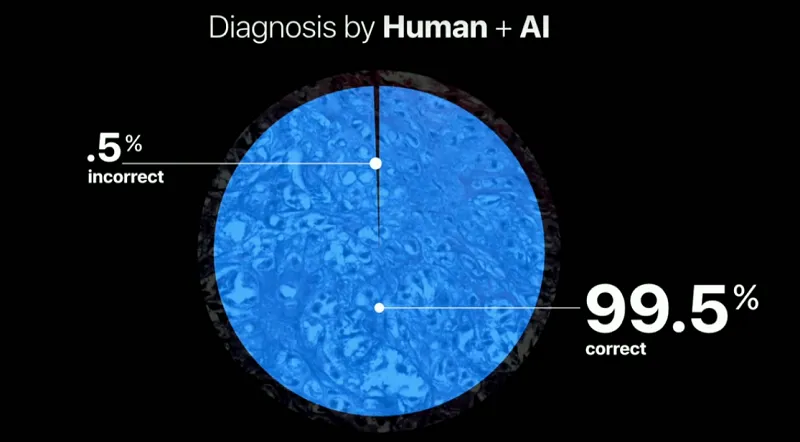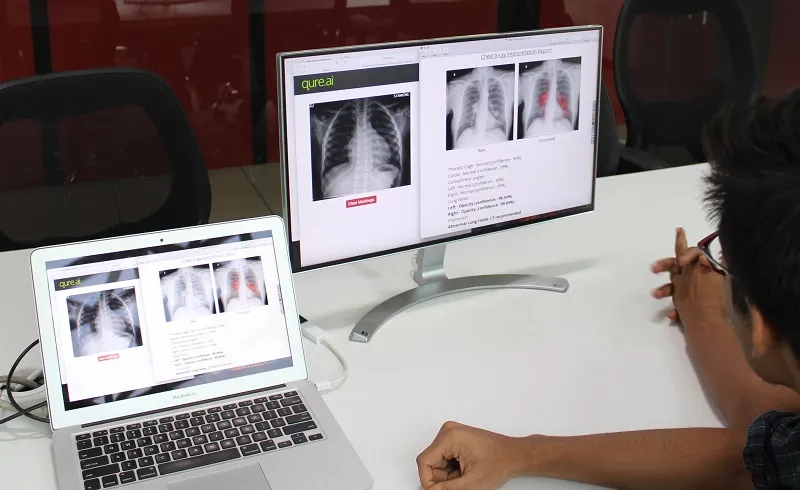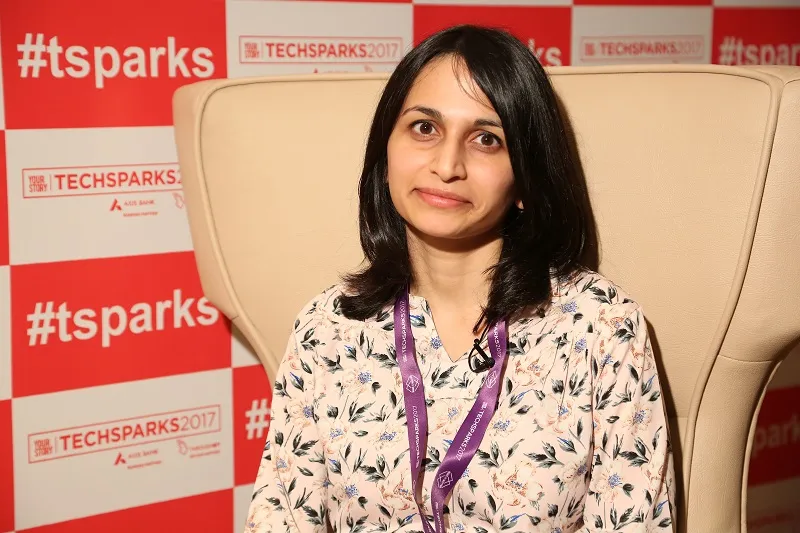Qure.ai is leveraging ‘humanistic AI’ to make medical diagnosis faster and more accurate
Artificial Intelligence (AI) and human diagnosticians could work together and accomplish more than what either could achieve independently. Here is how Mumbai-based Qure.ai is leveraging deep learning to diagnose and recommend personalised treatment plans faster.
Artificial Intelligence and automation are estimated to wipe out half of all jobs in the next decade. Global technological leaders though seem to be divided on the potential long-term impact.
At the current pace, Elon Musk, CEO of SpaceX and Tesla, sees a potentially apocalyptic future of AI and has asked for proactive regulations. Mark Zuckerberg, CEO of Facebook, on the other hand, has called Musk a naysayer and accused his doomsday fears as unnecessary negativity.
Tom Gruber, who co-founded Siri (which was later acquired by Apple), sees a middle path. In a recent TED Talk, he spoke about how ‘humanistic AI’ (where humans and AI work together), can actually accomplish more than what either could achieve independently. He shared an example of how by working together - an AI classifier and human pathologist - were able to achieve an accuracy rate of 99.5 percent.

Started in January 2016, Qure.ai, a Mumbai-based startup is attempting a similar feat by combining the powers of Machine Learning and human diagnosticians. The startup leverages deep learning technology to help diagnose diseases and recommend personalised treatment plans from healthcare imaging data such as CT, MRI scans and X-rays.
Qure.ai is also one of YourStory’s Tech 30 2017 startups. Here is their story:

Story so far
Qure.ai was co-founded by Pooja Rao (Head of R&D) and Prashant Warrier (CEO) who have strong technological backgrounds in medicine and Machine Learning. A physician by training, Pooja has a PhD in research from the International Max Planck Research School for Neuroscience focused on neuroscience and Machine Learning. She has previously worked as a bioinformatician at Genomescan, Leiden; and as a data scientist at GoDataDriven, Amsterdam.
With a BTech from IIT Delhi and PhD from Georgia Tech, Prashant had founded AI-powered personalised digital marketing firm Imagna Analytics, which was acquired by Fractal Analytics Inc. in 2015.
Qure.ai started in Mumbai in January 2016 with a small team of engineers. Now, more than a year later, Qure.ai still comprises a lean team of 14 employees.
Talking to YourStory, Pooja explained the pain points that both physicians and patients face. The volume and complexity of medical imaging has grown tremendously over the years. For doctors this means ever increasing workload and hence higher chances of misdiagnosis and errors. One small error can effectively make life or death in some cases.
Based on their understanding of the sector, Pooja and Prashant knew that deep learning technologies could process a large volume of medical data and detect anomalies based on patterns. So they decided to cofound Qure.ai and spent about a year on research and development and training their algorithms.
Talking about how machines and humans can work together to decrease chances of misdiagnosis, Pooja explains,
Our algorithm reads the X-ray or MRI scan to detect if there is an abnormality. If yes, it points it out to the doctor, who gets an augmented version of the scan with an extra layer of information. This makes their job easier and faster. It also prevents them from missing something they may not see otherwise.
How Qure.ai works
Radiologists have complex pieces of software for viewing these specialised scans. Qure.ai currently offers its products that are either standalone or built on top of existing technologies -
- A standalone API.
- Integrated with current radiology workflow - Qure.ai has a plugin that integrates with the radiologist’s software and calls out their cloud API, when needed. Pooja noted that this ensures that they don’t interrupt the radiologists regular workflow.
- Standalone web interface.

Pooja explained that one of the biggest use of its technology is in case of medical emergencies like accidents or a stroke. She says,
A stroke can be treated effectively if it is diagnosed correctly and treated within time. In case of accidents it helps speed things up immensely by helping detect bleeds and fractures faster.
Deep learning needs a lot of good quality data. Pooja informs that Qure.ai relies on partnerships and publicly available medical data to train its algorithms. They currently have a huge database of CT scans and MRIs.
Our chest X-ray product has processed more than 1.5 million X-rays.
When it comes to accuracy, Pooja noted that its chest X-Ray solution has reached close to human levels of accuracy, while its quantification solution has become more precise than a human could ever be.
Qure.ai’s solutions have been deployed across four clinics in Mumbai. Pooja shares that their early customers include radiologists, hospitals, and medical device manufacturers. The startup works on the SaaS based subscription model based on the customer's scale and custom needs.
Deployment of AI in the real world in a hospital setting is an exciting as well as a challenging task, according to Pooja. Because of the sheer volume of data available, she believes,
India is one of the best places to deploy AI in the real world. We have been able to collect feedback on how useful it has been to diagnosticians.
Sector overview and future plans
A report by American technology company Nvidia notes that medical records such as doctors' reports, test results, and medical images are a goldmine of health information. It re-asserts the belief that using GPU-accelerated deep learning to process and study a patient's condition over time and comparing one patient against a larger population could help doctors provide better treatments.
Large companies as well as startups are looking to operate in this space. Google researchers formulated an eye-scanning algorithm to detect a common form of blindness, showcasing the potential for AI to transform medicine. The algorithm can look at retinal images and detect diabetic retinopathy.

Companies like New York-based Behold.ai and San Francisco-based Arterys leverage AI to identify diseases from ordinary radiology image data and leverage technology to visualise and quantify heart flow in the body using any MRI machine, respectively.
San Francisco-based Enlitic is another venture that analyses medical images to identify tumors and nearly invisible fractures. Qure.ai’s work seems to most closely resemble Behold.ai and Enlitic.
Qure.ai, which is incubated by Fractal Analytics, notes that is has made its establishment in Mumbai and Delhi and has some presence overseas. The long term goal is to expand to the rest of India. Talking about the possibility of establishing themselves overseas, Pooja said,
When we have all the regulatory framework in place, we plan to expand outside India.
Website- Qure.ai







